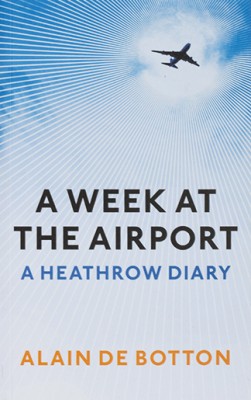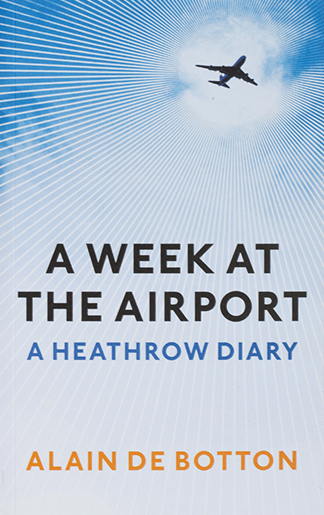Alain de Botton spent seven days living in a Heathrow hotel and working from a desk in the newly opened Terminal 5 in order to write a short book A Week at the Airport .
 He cast his voyeuristic glances in all directions, commentating on the sense of passion and the moment of separation of lovers, sitting on the closed runway in the middle of the night, as well as discovering that the terminal’s largest bookshop didn’t stock any of his titles.
He cast his voyeuristic glances in all directions, commentating on the sense of passion and the moment of separation of lovers, sitting on the closed runway in the middle of the night, as well as discovering that the terminal’s largest bookshop didn’t stock any of his titles.
Airport owners BAA were keen to set him up with an interview with British Airways Chief Executive Willie Walsh. Much like the offer of spending a week as writer-in-residence at Heathrow, he eventually gave in and accepted the interview.
But in his meandering prelude to his encounter with the nerdish airline chief, Alain de Botton throws out some ideas about the act of an interview.
Journalism has long been enamoured of the idea of the interview, beneath which lies a fantasy about access: a remote figure, beyond the reach of the ordinary public and otherwise occupied with running the world, opens up and reveals his [Ed – or her?] innermost self to a correspondent. With admission set at the price of a newspaper, the audience is invited to forget their station in life and accompany the interviewer into the palace or the executive suite …
But the tantalising promise of shared secrets is rarely fulfilled as we might wish, for it is almost never in the interests of a prominent figure to become intimate with a member of the press. He has better people on to whom to unburden himself. He does not need a new friends. He is not going to disclose his plots for vengeance or his fears about his professional future. For the celebrity, the interview is thus generally reduced to an exercise in saying as little as possible without confounding the self-love of the journalist on the sofa, who might become dangerous if rendered too starkly aware of the futility of the mission. (emphasis added)
Peter Robinson, the DUP and the Free Presbyterian Church may wish that it had been so when Eamonn Mallie interviewed Ian Paisley as we await part two – the “New Testament” – to be broadcast on Monday evening (BBC One NI at 10:35pm).
[I’m pretty sure that in the few interviews with Lord Bannside after Eamonn Mallie finished in March 2013, Ian Jnr has sat in – for example, Mark Carruthers’ book – perhaps to ensure that recollections are tight and don’t stray into controversial territories?]
Alan Meban. Tweets as @alaninbelfast. Blogs about cinema and theatre over at Alan in Belfast. A freelancer who writes about, reports from, live-tweets and live-streams civic, academic and political events and conferences. He delivers social media training/coaching; produces podcasts and radio programmes; is a FactCheckNI director; a member of Ofcom’s Advisory Committee for Northern Ireland; and a member of the Corrymeela Community.
Discover more from Slugger O'Toole
Subscribe to get the latest posts to your email.
